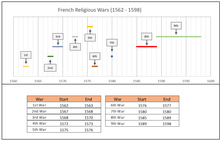
Back حروب فرنسا الدينية Arabic Guerres de relixón de Francia AST Fransada dini müharibələr Azerbaijani فرانسه دین ساواشلاری AZB Рэлігійныя войны ў Францыі Byelorussian Религиозни войни във Франция Bulgarian Brezelioù ar Relijion (Bro-C'hall) Breton Guerres de religió a França Catalan Hugenotské války Czech Rhyfeloedd Crefydd Ffrainc Welsh
This article needs additional citations for verification. (September 2022) |
The French Wars of Religion were a series of civil wars between French Catholics and Protestants (called Huguenots) from 1562 to 1598. Between two and four million people died from violence, famine or disease directly caused by the conflict, and it severely damaged the power of the French monarchy.[1] One of its most notorious episodes was the St. Bartholomew's Day massacre in 1572. The fighting ended with a compromise in 1598, when Henry of Navarre, who had converted to Catholicism in 1593, was proclaimed King Henry IV of France and issued the Edict of Nantes, which granted substantial rights and freedoms to the Huguenots. However, Catholics continued to disapprove of Protestants and of Henry, and his assassination in 1610 triggered a fresh round of Huguenot rebellions in the 1620s.
Tensions between the two religions had been building since the 1530s, exacerbating existing regional divisions. The death of Henry II of France in July 1559 initiated a prolonged struggle for power between his widow Catherine de' Medici and powerful nobles. These included a fervently Catholic faction led by the Guise and Montmorency families, and Protestants headed by the House of Condé and Jeanne d'Albret. Both sides received assistance from external powers, with Spain and Savoy supporting the Catholics, and England and the Dutch Republic backing the Protestants.
Moderates, also known as Politiques, hoped to maintain order by centralising power and making concessions to Huguenots, rather than the policies of repression pursued by Henry II and his father Francis I. They were initially supported by Catherine de' Medici, whose January 1562 Edict of Saint-Germain was strongly opposed by the Guise faction and led to an outbreak of widespread fighting in March. She later hardened her stance and backed the 1572 St. Bartholomew's Day massacre in Paris, which resulted in Catholic mobs killing between 5,000 and 30,000 Protestants throughout France.
The wars threatened the authority of the monarchy and the last Valois kings, Catherine's three sons Francis II, Charles IX, and Henry III. Their Bourbon successor Henry IV responded by creating a strong central state and extending toleration to Huguenots; the latter policy would last until 1685, when Henry's grandson Louis XIV revoked the Edict of Nantes.

- ^ a b Knecht 2002, p. 91.
